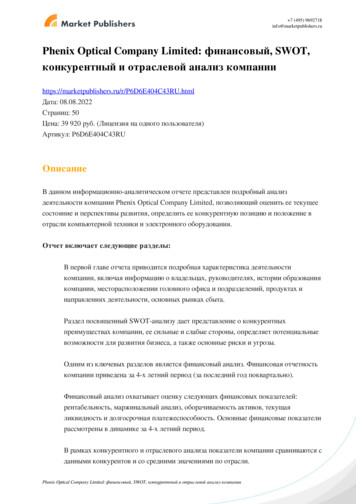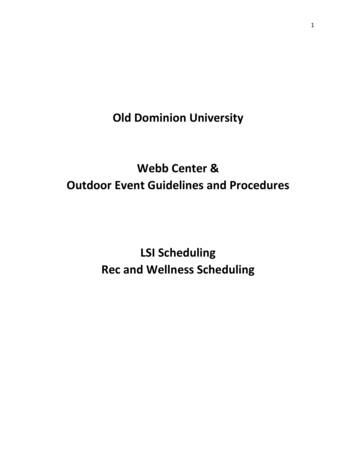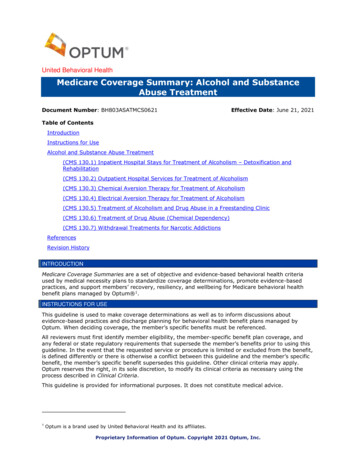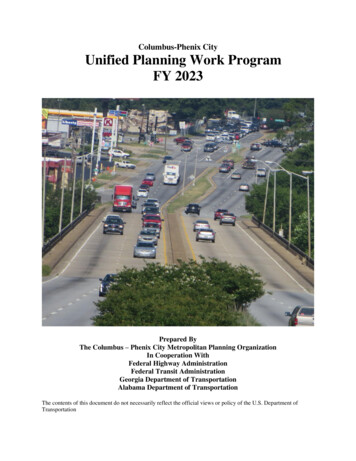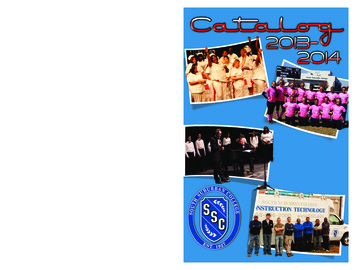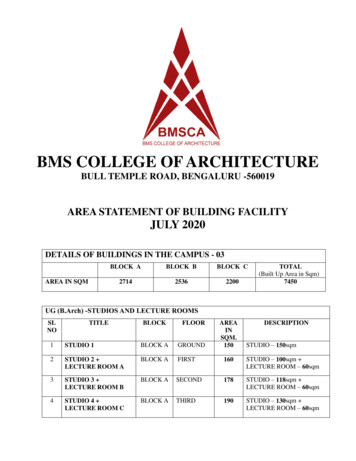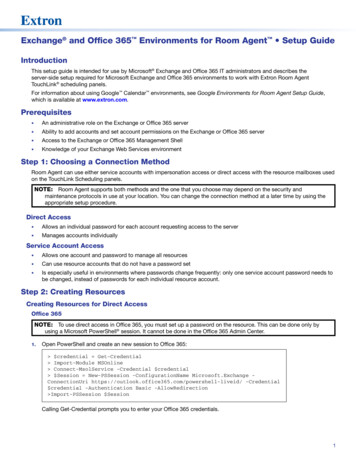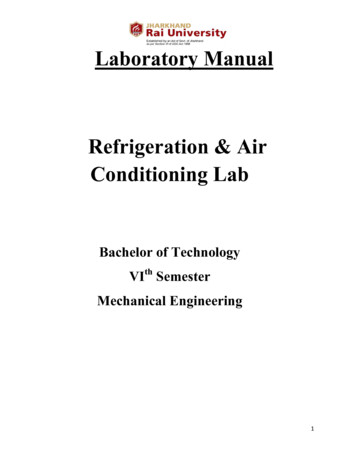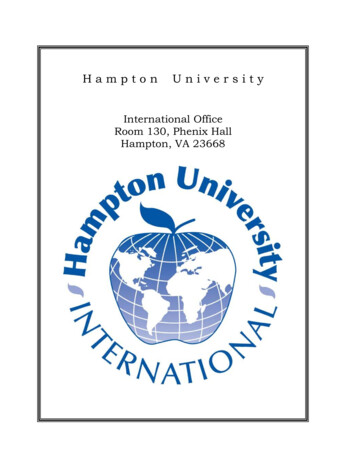
Transcription
HamptonUniversityInternational OfficeRoom 130, Phenix HallHampton, VA 23668
Hampton UniversityHampton, Virginia 23668International OfficeRoom 130, Phenix Hall757-728-6914Dear International Student:Welcome to Hampton University!This handbook is designed to help you adjust to life at Hampton University, an AmericanUniversity with a unique and distinguished history. The first international students were enrolledwhen Hampton University was founded in 1868. We hope that your years with us in our "Homeby the Sea" will be educationally profitable for you. In return, your presence in our communitywill continue to enrich and broaden our multi-cultural environment.The handbook clarifies some of the regulations and procedures that apply to you as aninternational student. Please pay particular attention to the 2009 Federal Regulations affectingyour program of study and your right to work while studying in the United States. Among otherareas, Federal Regulations affect the following important aspects of your study program: The length of your program of study, The number of courses in which you must enroll each semester, The procedure to follow when changing institutions or programs of study When and where you may workPlease review the regulations carefully. Contact the HU International Office, if you have anyquestions.Be sure to check in as soon as you arrive with the HU International Office, Room 130, PhenixHall. The telephone number is 757-728-6914.Very cordially,Mrs. Marcia Jackson, International Office/Study Abroad Coordinator
Table of ContentsI. International Office: An Overview, Contact Information .4II. Applying for your visa .5III. Maintaining Lawful Immigration Status.10o Important Definitions.15o USCIS and Department of State websites .19o Work Regulations (on campus, OPT, CPT, Financial Hardship) .19o Social Security Number, eligibility and application procedures .21o Taxes, filing requirements .21o Driver's Licenses and Automobile Information.22IV. Hampton University and the Community.23o Important Facts About the University Calendar .23o Transportation, Airports, etc. .25o Accommodation, Hotels .26o Housing, Information for Renters (leases, utilities, etc.) .26o Banking .29o Shopping .31o The City of Hampton, History and Attractions .33o University Health Services .35o Medical Insurance .36o Medical Terminology.36o Personal Safety.38o Churches and Religious Activities.39o Student Associations, International Students Association.39o Adjusting to a New Culture .40o Conclusion - Life in the United States.42Appendices and links to important government documents.
I. Hampton University International Office --OverviewThe Hampton University international students’ community includes over 150 students fromnumerous foreign countries and five continents.Under the auspices of the College of Education and Continuing Studies, the International Officeoversees all matters related to international educational programs at the university. TheInternational Office handles study abroad programs, student foreign exchange programs andadvises faculty on related grants opportunities and scholarly exchanges.The office houses the Designated School Official (DSO) to assist international students incomplying with regulations of the Bureau of Citizenship and Immigration Services (USCIS).Special orientation programs and workshops for international students and scholars will help youmaintain status as you pursue your degree. Topics will include enrollment requirements and thetime frame for completing your program of study, special registrations that may be required fromtime-to-time, permission to work under certain authorized circumstances, travel regulations, taxinformation and other important matters.The International Office serves as a one-stop service facility for the entire Hampton Universitycampus focused on coordinating educational outreach, social activities and academic enrichmentopportunities for all students, faculty and the community at-large. In addition, the Office offersreferrals on related issues such as international student activities, community outreach andindividual and group assistance with the many cultural aspects of studying in a foreign country.Contact InformationHampton University International OfficeRoom 130, Phenix HallPhone 757-728-6914 (messages are checked regularly at all times of year)Email: internationaloffice@hamptonu.eduLeaving or picking up materials when the office is closed:1. You may leave messages and documents in Phenix Hall, Room 301a (757-727-5751)with Ms. Penny Cook. You may pick up completed documents there as well. TheDepartment’s Administrative Assistant is available during regular business hours twelvemonths a year.International students are required to sign up for a Hampton University pipeline emailaddress. For important announcements: check the International Students Blackboard Site, onthe Hampton University website, where documents, this handbook, special announcements andother information are posted.4
II. Applying for your VisaThe certificate of eligibility I-20 or DS-3036 you have received from Hampton University is agovernment document. The information has been entered on a website of the US Department ofState to help confirm that you have been admitted to the university and are eligible for an F-1 (orJ-1) visa to enter the country. For further explanations of each document, see the StateDepartment Website: http://travel.state.gov/visa/visa 1750.html.If for any reason you will not enroll at Hampton University by the date indicated on your I-20,please return the I-20 to the HU International Office with a brief explanation of the reason (i.e.,change of plans, denial of visa, decision to defer study). The returned I-20 will be canceled.Please notify the Admissions Office or Graduate College if you wish to defer your enrollment atHampton University. New forms will be sent to you and a new or updated certificate ofeligibility will be issued for the semester when you intend to enroll.For current information on how to apply for a visa, how much time to allow for the applicationprocedure and recent changes in procedure, please go to the State Department website:http://travel.state.gov/visa/visa 1750.html. After reading the introduction, go to for furtherinformation about the application process for your country.Preparing For Your F-1 Visa InterviewThis information was prepared by the Association of International Educators (NAFSA) forpeople who plan to enter the United States for the first time to study. For information on bringingdependents to the US, returning to continue studies, or renewing your visa, or for more details onhow to apply for a student visa, refer to the US Department of State website, at:http://travel.state.gov/visa/temp/types/types 1268.html. Please share this information with anyfriends or relatives who are considering study in the United States.5
Steps1. Contact your local U.S. Consulate or Embassy to ask about how to get an F-1 internationalstudent visa.2. After you receive an I-20 form from the school that you want to attend, follow the U.S.Embassy/Consulate's instructions to schedule an interview for your F-1 student visa. It isimportant to apply for your student visa as far in advance as possible. Many consulatesrecommend that appointments be made no more than 90 days from the intended date of travel,but some can make earlier arrangements for interviews.3. Pay the visa application fee by following instructions on your local U.S. Embassy's orConsulate's web site.4. If your I-20 was issued on or after September 1, 2004, and is marked for ““initial"attendance (see #3 on your I-20 form), you will also need to pay the 200 SEVIS fee.5. Complete the following forms: DS-156 Nonimmigrant Visa Application FormDS-158 Contact Information and Work History for Nonimmigrant Visa Applicantif a male between the ages of 16 and 45, DS-157 Supplemental Nonimmigrant VisaApplicationTo Pay By Mail Get a Form I-901 “ Fee Remittance for Certain F, J, and M Nonimmigrants." Download the I-901 form orAsk for the form by phone at 800.870.3676 (inside the United States) Complete the Form I-901. Be sure to write your name exactly how it appears on your I20 form. Prepare a check, international money order or foreign draft (drawn on US banks only1) inthe amount of 200 USD, made payable to “ The Department of HomelandSecurity, Immigration and Customs Enforcement." Many foreign banks are able to issue checks or money orders drawn on a U.S. bank. Youmay therefore obtain a check from a bank chartered or operated in the United States, aforeign subsidiary of a U.S. bank, or a foreign bank that has an arrangement with a U.S.bank to issue a check, money order, or foreign draft that is drawn on a U.S. bank Mail the completed I-901 and payment to the address listed on Form I-901.6
A Form I-797 receipt confirmation letter should be mailed within 3 days of processingthe fee. Be sure to make copies of this receipt letter, and keep it with your other importantimmigration documents.To Pay Online Find the I-901 FormComplete the form online and supply the necessary Visa, MasterCard or AmericanExpress information. *Be sure to write your name exactly how it appears on your I-20form.Print a copy of the online receipt.Be sure to make copies of your receipt, and keep it with your other importantimmigration documentsYou must bring the receipt of fee payment with you to the interview. If you have lost thereceipt, the Visa Officer should be able to view your payment history in his or herdatabase.If you are transferring schools, extending your program, applying for an F-2 dependentvisa, or have paid this fee and been denied a visa within the last twelve months, you donot need to pay the 200 SEVIS fee.6. Prepare and bring to your visa interview the following: A passport valid for at least six monthsForm I-20 (sign the form under Item 11)School admission letterCompleted visa applications (DS-156, DS-158, and, if applicable, DS-157)Two 2"x 2" photographs in the prescribed formatA receipt for the visa application feeA receipt for the SEVIS fee. If you have not received an official receipt in the mailshowing payment and you paid the fee electronically, the consulate will accept thetemporary receipt you printed from your computer. If you do not have a receipt, theconsulate may be able to see your payment electronically if your fee payment wasprocessed at least 3 business days before your interview.Financial evidence that shows you have sufficient funds to cover your tuition and livingexpenses during the period you intend to study.Any information that proves that you will return to your home country after finishingyour studies in the United States. This may include proof of property, family, or other tiesto your community.Please see the State Department website (www.state.gov) and check the page for theU.S. consulate in your country for the most recent updates and details.7
Ten Points to Remember when Applying for a Nonimmigrant Visa(Modified from NAFSA, Association of International Educators & the U.S. Department of State)You may apply for your visa up to 120 days prior to your start date. Please check the embassy website forinformation on how to schedule your appointment. Enter the following information for contact person on the visaapplication form: Marilyn Andrew, Denison University, Granville, Ohio 43023, Phone: 740-587-57391. TIES TO YOUR HOME COUNTRY: Under U.S. law, all applicants for nonimmigrantvisas, such as student visas, are viewed as intending immigrants until they can convince theconsular officer that they are not. You must therefore be able to show that you have reasons forreturning to your home country that are stronger than those for remaining in the United States.“Ties” to your home countries are the things that bind you to your hometown, homeland, orcurrent place of residence: job, family, financial prospects that you own or will inherit,investments, etc. If you are a prospective undergraduate, the interviewing officer may ask aboutyour specific intentions or promise of future employment, family or other relationships,educational objectives, grades, long-range plans and career prospects in your home country.Each person’s situation is different and there is no magic explanation or single document,certificate, or letter that will guarantee visa issuance.2. DOCUMENTATION: Evidence of sufficient funds to cover expenses as well as evidence ofscholastic preparation may be requested. Make sure to include your letter of acceptance fromDenison University along with your I-20. If you have immediate family members (parents,siblings) in the U.S., be prepared to explain why they are here and what they are doing in theU.S. It should be immediately clear to the consular officer what written documents you arepresenting and what they signify. Lengthy written explanations cannot be read quickly orevaluated. Remember that the interview time is typically less than ten minutes. For additionalinformation, please see the web sites listed on next page.3. LANGUAGE: Anticipate that the interview will be conducted in English and not in yournative language. One suggestion is to practice English conversation with a native speaker beforethe interview, but do not prepare speeches. Americans generally use direct eye contact whencommunicating so it is advisable to do the same.4. SPEAK FOR YOURSELF: Do not bring parents or family members with you to theinterview. The consular officer wants to interview you, not your family. A negative impressionis created if you are not prepared to speak on your own behalf. If you are a minor (under age 18)and need your parents there in case there are questions, for example about funding, they shouldwait in the waiting room.5. KNOW THE PROGRAM AND HOW IT FITS YOUR CAREER PLANS: If you are notable to articulate the reasons you will study in a particular program in the United Sates, you maynot succeed in convincing the consular officer that you are indeed planning to study, rather thanto immigrate. You should also be able to explain how studying in the U. S. relates to your futureprofessional career when you return home. Lastly, be prepared to answer the following question:What will you do if your visa application is denied?8
6. BE BRIEF: Because of the volume of applications received, all consular officers are underconsiderable time pressure to conduct a quick and efficient interview. They must make adecision, for the most part, on the impressions they form during the first minute of the interview.Consequently, what you say first and the initial impression you create are critical to yoursuccess. Keep your answers to the officer’s questions short and to the point and remember tospeak clearly.7. NOT ALL COUNTRIES ARE EQUAL: Applicants from countries with a history ofterrorist activities may encounter additional scrutiny. Countries suffering economic problems orapplicants from countries where students have remained in the U.S. as immigrants may havemore difficulty obtaining visas – statistically, applicants from those countries are more likely tobe intending to immigrate. If you are from such a country, you may be asked about jobopportunities at home after your study in the U.S.8. EMPLOYMENT: Your main purpose in coming to the United States should be to study, notfor the chance to work after graduation. While a number of students do work over the course oftheir studies, such employment requires authorization and is incidental to the main purpose ofcompleting their U.S. education. You must be able to clearly articulate your plan to return homeat the end of your program.9. APPLY IN YOUR HOME COUNTRY: Applicants for student visas should generally applyat the U.S. Embassy or Consulate with jurisdiction over their place of permanent residence.Although visa applicants may apply at any U.S. consular office abroad, it may be more difficultto qualify for the visa outside the country of permanent residence.10. MAINTAIN A POSITIVE ATTITUDE: Do not engage the consular officer in anargument. If you are denied a student visa, request the reason you were denied in writing andask the officer for a list of documents to bring in order to overcome the denial.9
Travel IssuesInternational students enrolled at Hampton University who plan to travel outside the U.S. shouldbe aware of the following issues.1) I-20: A valid travel signature on page 3 of your current I-20 is necessary for travel. The travelsignature is valid for one year and multiple entries for those studying. It is valid for 6 months forthose on post-completion OPT.2) Passport: The passport should be valid for 6 months beyond the date on which they plan tore-enter the U.S.3) A valid U.S. visa. If the visa has expired, arrangements should be made to get a new visa. Formore information, see the OIE website at: .4) Automatic Revalidation of Visa: If the student: has an expired visa;has currently maintaining status in the U.S.;is NOT a national of Cuba, Iran, North Korea, Sudan, and Syria,and is visiting Canada or Mexico for less than 30 daysFor such trips, the student may re-enter the U.S. with an expired visa. The student will only needa valid passport, the passport with the expired visa (if in a different passport), and an I-20 with avalid travel signature. When the student leaves the US, they should keep their current I-94 card.It is important to know however that travelling to Canada or Mexico for convenience sake torenew your visa is risky. If your visa is denied or your application is subjected to background orsecurity checks, you more than likely will be stuck in Canada or Mexico for a significant amountof time. If your visa is denied for any reason you will be required to return to your home countryto re-apply. You will not be able to take advantage of Automatic revalidation.To view the Code of Federal Regulations regarding Automatic Revalidation of Visa, visit thefollowing tcfr.cgi?TITLE 22&PART 41&SECTION 112&YEAR 2002&TYPE TEXT5) Department of Homeland Security recommends students have their transcripts andproof of financial support with them when they return.6) Special Registrants: Special registrants must currently appear before an inspecting officer atthe port of departure before leaving the US.Frequently Asked Questions on Reentering to the US are on the Immigration and CustomEnforcement Website: http://www.ice.gov/sevis/travel/faq f.htm10
III. Maintaining Lawful Immigration StatusA. J-1 Scholar:J-1 scholars must contact the Office of Human Resources (ext. 5250) for instructions related tomaintaining status, work requirements and the like. For information about changes of statusfrom F-1 to J-1 or from J-1 to F-1, scholars should consult both Human Resources and theHampton University International Office for a complete review of current procedures.B. F-1 Student:Please read page two of your I-20 carefully before you sign it. All international students in F-1status are obligated to follow regulations of the Bureau of Citizenship and Immigration Services(USCIS) in order to maintain their lawful immigration status during their stay in the US Thestudent is responsible for maintaining F-1 status. When you complete and sign section 11 of theI-20, you certify that you have read and understood all of the terms and conditions of the F-1status and agree to abide by them.Students who fail to comply with the requirements listed below will be out-of-status. In order tomaintain lawful F-1 immigration status, it is your responsibility, as a student, to do the following:1. Keep your passport valid at all times. Provide the HU International Office with a copyof the passport pages showing the number, dates of validity and F-1 visa. Passports maybe revalidated or reissued in the US by the embassy of the country that issued yourpassport. Students should apply for a new passport about 7-8 months PRIOR to the dateof expiration. Keep your new passport stapled to the old one that still contains your F-1visa. See the State Department website for new requirements for passports.2. Keep your I-20 valid at all times. Students should check sections 4, 5, and 8 of the I-20on a regular basis and notify the HU International Office immediately about anychanges/declarations of major, degree level, or financial support. If you drop out ofclasses or below a full time course of study, your I-20 automatically becomes invalid.Students should also notify the HU International Office about any errors or misspellingson the I-20. Failure to maintain a valid and accurate I-20 can result in seriousimmigration problems for you. Your I-20 records are maintained on a State Departmentwebsite (SEVIS) that must be up-to-date in order for you to maintain status, travel andbenefit from the other privileges of F-1 status. Whenever you are issued a new I-20,staple it to the old one/s as a permanent record of updates to your F-1 status.Note: Notify the HU International Office prior to the semester in which you intend tograduate. Your expected completion date will need to be updated. Some important factorsmay affect your option to enroll for fewer classes in the final semester, to qualify forOptional Practical Training and other benefits of F-1 status.11
3. Attend the school you are authorized to attend as noted on your I-20 (section 2) and asnoted on your visa or as changed by issuance of a new I-20. A student who attendsHampton University without authorization and an I-20 issued by this university, or whofails to comply with proper USCIS transfer procedures, is considered to be out-of-statusand should consult the HU International Office immediately.A student who has another school listed on his/her visa should consult with theHU International Office immediately to make sure the records are in order.However, if you transferred to Hampton University after attending another USinstitution, your visa remains valid with the former school's name on it.4. Maintain full-time enrollment each semester and make normal progress towards thecompletion of your course of study (degree). Full-time enrollment is defined as 12 credithours for all undergraduate students including students in programs of the Department ofContinuing Education, and 9 credit hours for graduate students. Do not allow yourcourse load to drop below this minimum. Please see the section on AcademicProbation. If you are not able to enroll in the next level of courses required for yourmajor, you must still maintain a full course of study or arrange to leave the country untilyou can resume your intended course of study.A few exceptions can be made to this full-time rule, but only with prior writtenapproval from the Hampton University International Office. Students who fail to obtainprior written approval on a new I-20 from the HU International Office beforedropping below full-time enrollment will be in violation of F-1 status.If you are notified that you are on academic probation and must withdraw from classesand/or that you must follow certain restrictions in your course of study, contact the HUInternational Office immediately and follow correct procedures. Be prepared to returnhome in order to take the next steps to continue your studies. Failure to comply withregulations could result in denial of permission to resume your studies or to transferlawfully to another institution.5. Do not work off-campus without prior written authorization and a new I-20 from theHampton University International Office. See instructions below. An EmploymentAuthorization Document (EAD) from USCIS may also be required for certain types ofemployment. Do not work off-campus more than 20 hours per week while school is insession (during the fall and spring semesters).6. Work on-campus no more than 20 hours per week while school is in session (duringfall and spring semesters). Full-time on-campus employment (of more than 20 hours perweek) is only permitted during vacation periods, if the student was enrolled full-timeduring the previous semester and will be enrolled full-time the following semester.Reminder: J-1 scholars must comply with the requirements of their program. In mostcases, this will limit their work opportunities to those. For any questions aboutauthorization to work, J-1 scholars should contact the Office of Human Resources.12
8. Report any changes of address/name and phone number to the Hampton UniversityInternational Office within 10 days of any change. This is a requirement of the federalregulations. The Hampton University International Office must update the SEVISrecords. Please note that the University is required by law to keep this information up-todate for all international students. In addition, you must notify the University Registrar’s Office (the HamptonUniversity International Office cannot do this for you). Include both yourphysical address and your mailing address and phone number.9. Notify the HU International Office about any change of degree level (from abachelor’s to a master’s degree, etc), or any changes or declarations within your major,and apply for a new I-20 within 30 days after completing your first degree orchanging/declaring your major. You must also notify the Hampton UniversityInternational Office of any other changes such as an extension of your program (i.e. thedate when you expect to graduate) or an interruption of your program of study foracademic or other reasons.10. Notify the HU International Office if you plan to withdraw, transfer, or cease yourenrollment at Hampton University for any reason including academic probation. Studentsmust notify the HU International Office before they interrupt or terminate their studies atthe University (without completing the degree) and will have 15 days to depart the USStudents who do not notify the Hampton University International Office beforeterminating their studies must depart the US immediately and could face seriousimmigration problems if they are found to be in the United States during the academicyear without being enrolled in an approved program of study.11. Transfer Students--notify the HU International Office that you are transferring, notifythe International Office or Designated School Official at the school you will be attending,and follow instructions for transferring your SEVIS records from one institution to theother and for obtaining a new SEVIS I-20 from the new school. Report to theInternational Office (or other Designated School Official) at the new school within 15days of beginning attendance. Failure to do so is a violation of the F-1 status. You willnot be properly registered in SEVIS and will be out of status.12. Apply for an F-1 program extension at least 30 days before the program expirationdate on your current I-20 if you cannot complete your degree by the date listed in section5 of your current I-20. F-1 program extensions can only be granted for certain reasons,and can only be granted prior to the date of expiration on the I-20, so it is essential toconsult with the HU International Office in advance and take the proper steps to maintainstatus.13. Notify the Hampton University International Office and leave the United Stateswithin the 60 days after the program expiration on your I-20 (section 5) or your actualcompletion date, whichever is first. Failure to do so is a violation of the F-1 status.13
Exceptions are made for the summer vacation between graduation and the beginning ofstudies at another institution, and for certain other brief periods provided authorizationis given.Note: Academic Probation: A student who is placed on academic probation maybe ineligible to enroll at Hampton University and may automatically lose F-1status. If you are notified that you are placed on academic probation, you mustcontact the HU International Office immediately. If you are not allowed toregister for classes, you are required by law to leave the country within twoweeks. You may need to reapply for admission to the University. A new I-20will be required to re-enter the United States to re-enroll at Hampton Universityand temporary restrictions to your eligibility to work will apply.14. Maintain contact with the Hampton University International Office and the USCISwebsite to learn about any announcements, changes in USCIS regulations, mandatoryUSCIS registration requirements or other matters affecting international students in theUnited States. Check your Hampton University pipeline email at least once a week forany important notices and sign up for t
Hampton University Hampton, Virginia 23668 International Office Room 130, Phenix Hall 757-728-6914 Dear International Student: Welcome to Hampton University! This handbook is designed to help you adjust to life at Hampton University, an American University with a unique and distinguished history.
